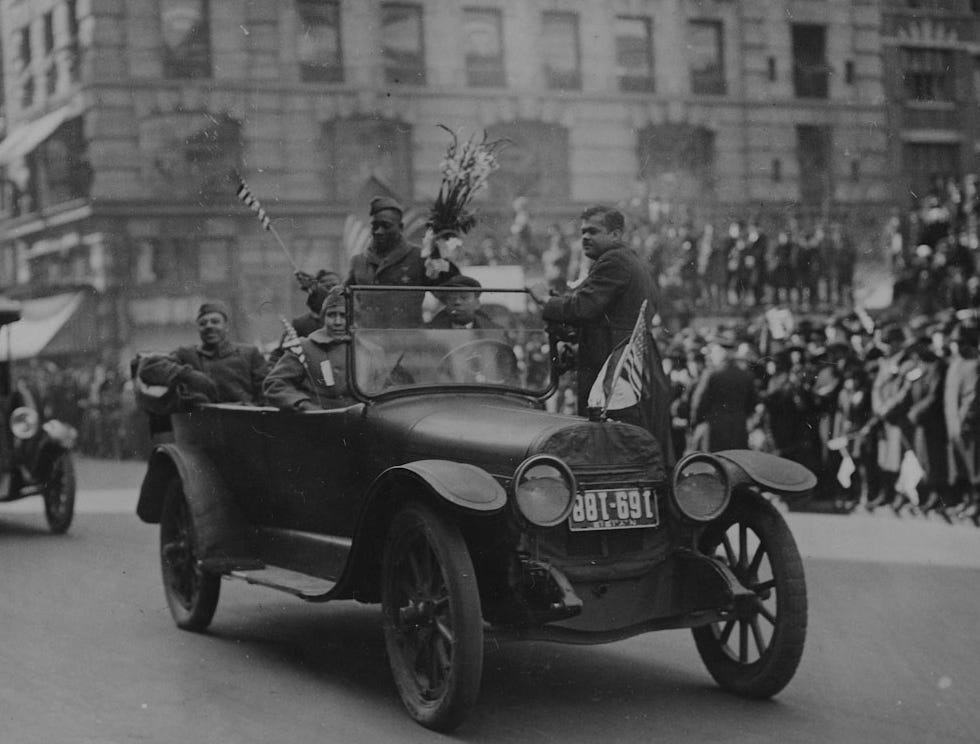Medal of Honor Monday: Henry Johnson
He had already been awarded the French Croix de Guerre. He would also ultimately receive a Medal of Honor. Perhaps no one expected the 5’4” railroad porter from Albany to become such a hero?
During this week in 1919, a parade welcomes the New York National Guard home from World War I. Among the American heroes recognized that day was Private Henry Johnson. He had already been awarded the French Croix de Guerre. He would also ultimately receive a Medal of Honor.
Perhaps no one expected the 5’4” railroad porter from Albany to become such a hero?
Soon after the United States entered World War I, Johnson enlisted in an all-black regiment. The 369th Infantry departed for France by the end of 1917, where they would serve under French command.
Johnson’s heroism came during the wee morning hours of May 15. He and another soldier, Private Needham Roberts, were on sentry duty near the front lines. They were protecting both a French and an American regiment behind them.
Shortly after 2 a.m., the silence of the night was broken by the sound of wire clippers.
The two men were under attack. Johnson’s Medal citation would later describe a “German raiding party consisting of at least 12 soldiers,” but other sources indicate a larger enemy force of two dozen or more. Either way, Johnson and Roberts were both injured immediately. They began throwing grenades, and when enemy soldiers began entering their outpost, Johnson fired.
He was quickly out of bullets, with no opportunity to reload. The butt of his rifle would have to do. He knocked down the next German to come at him.
“The German went down,” Arthur Little, the 1st Battalion Commander, later wrote, “crying, in perfectly good Bowery English, ‘The little black so and so has got me!’ But Johnson retorted that this “little black so [&] so” would get the German again, if he got up.
At that moment, Johnson glanced over to see how Roberts was faring. An unwelcome sight met his eyes: The badly wounded Roberts was being carried away, a prisoner.
Johnson lunged toward the enemy, his bolo knife in hand. The injuries that followed were fairly gruesome. Ultimately, Johnson would be credited with killing four Germans and wounding up to 22 more. “There wasn’t anything so fine about it,” Johnson later said of his hand-to-hand combat. “Just fought for my life. A rabbit would have done that.”
Perhaps, but Johnson did still more: He saved his fellow soldier. He protected the regiments behind him. He proved the worth of black soldiers to those who (unfortunately) then still remained doubtful. And, as it turns out, he also ensured the capture of quite a bit of German equipment.
It got left behind when the German party turned—and fled.
The French were quick to recognize both Johnson and Roberts with the Croix du Guerre, that nation’s highest military honor. Indeed, Johnson’s bravery and daring quickly made news headlines back home, too. Americans lauded Johnson as a hero, and former President Teddy Roosevelt called him one of the “five bravest Americans” to serve in World War I. Johnson was promoted to Sergeant, and he led a parade in New York on behalf of his regiment on February 17, 1919.
Nevertheless, news headlines receded, as they tend to do. Johnson was left a wounded veteran, unable to work. He passed away, destitute, in 1929.
It was a sad and undeserved end to Johnson’s story, but at least one wrong was finally made right a few years ago: The Department of Defense concluded that Johnson should have received a Medal of Honor for his bravery a century ago.
Sergeant Johnson was posthumously awarded his Medal in 2015.
Sources can always be found on my website, here.





I have heard Henry Johnson's story before and am still impressed at this man's bravery. His dedication to his duty is remarkable and inspiring. It is sad that his sacrifice included a delayed death from his wounds and a lack of care for American veterans. We do a little better today, but the care provided veterans is forced to be second rate by those who hold purse strings. Thankfully, those who work at the VA are dedicated to their charges for the most part, but they are human. That said, Johnson certainly deserved a MOH. He was a extraordinary soldier.
Doesn’t matter the rank, a soldier is a soldier. It’s just too bad that it took so long to bestow the Medal of Honor on such a deserving man. It’s just one heartbreaking account of how so many of our vets have been forgotten and under valued. So thankful for each and every one of them.